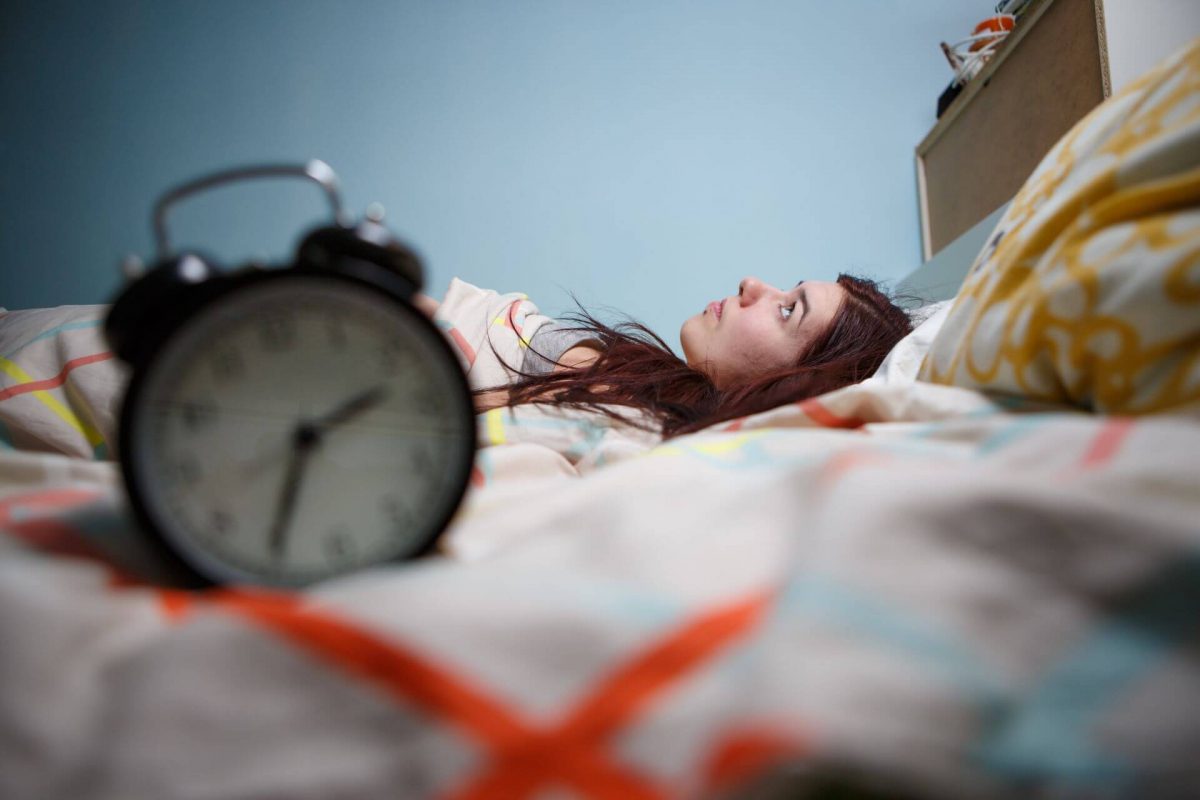Common mental disorders such as depression, anxiety and PTSD are linked to sleep deprivation. Insomnia or poor quality sleep also increases the risk of drug and alcohol use which can lead to dependency and ultimately addiction.
We look at the connection between sleep and substance abuse disorders and provide insight into how important it is to improve your sleep habits; either to reduce the risk of addiction or as part of your addiction recovery Program.
Source
We’ve drawn on information provided by the National Institute of Drug Use; a United States federal-government research institute whose mission is to “advance science on the causes and consequences of drug use and addiction and to apply that knowledge to improve individual and public health.”

How substance abuse affects sleep
Most kinds of substance use acutely disrupt sleep-regulatory systems in the brain. This affects how long it takes you to fall asleep, how long you sleep for and the quality of sleep you experience.
Substance abuse has a dangerous impact on your physical and mental health where it causes sleep deprivation. This because the main purpose of sleep is to consolidate new memories and poor quality sleep makes it harder for someone in addiction recovery to learn new coping and self-regulations skills.
Dopamine is key to the neurobiological link between substance use disorders and poor quality sleep. When you use drugs, the substance directly or indirectly stimulates dopamine reward pathways which is what makes them addictive.
The most potent dopamine-increasing drugs are cocaine and amphetamine-based drugs like methamphetamine. Repeated use of these two drugs can lead to severe sleep deprivation. This in turn plays havoc with your sleep-wake cycle.

How poor quality sleep increases the risk of addiction
Research shows that sleep deprivation downregulates dopamine receptors which in turn can make people more impulsive and vulnerable to risky behaviour which leads to alcohol and drug abuse.
Dopamine receptors are typically stable; however, sharp or prolonged increases or decreases in dopamine levels can downregulate (reduce the numbers of) or upregulate (increase the numbers of) dopamine receptors.
People who suffer from insomnia may be at increased risk of addiction because they are more likely to self-medicate for their sleep problems or use alcohol or drugs such as benzodiazepines while under the impression they help you relax and switch off from stress.
Insomniacs may also use stimulant drugs to deal with extreme fatigue during the day if they’ve slept very badly the night before. This might include “study drugs” that have a reputation for helping you stay awake, be more alert and help your concentration.

What is a “study drug”?
“Study drugs” as they are called in student circles are stimulant prescription drugs that generally contain amphetamines. They are used illegally by students and business people to help with concentration and to keep people awake for longer to study or work on a project.
The most commonly abused “study drugs” are used for ADD (Attention Deficit Disorder) and ADHD (Attention Deficit Hyperactivity Disorder).
Study drugs provide short-term alertness to help users get through an all-nighter of studying for exams which should help them perform better academically. Individuals who take prescription medications for ADD or ADHD are often guilty of giving or selling them to their peers during exam time.
Prolonged abuse of study drugs can have long-term adverse side-effects on your brain and cause you to make poor decisions. They may also lead to addiction in adulthood. Stimulants used for ADD and ADHD such as Ritalin, Adderall and Vyvanse can be habit-forming and have a high potential for abuse.
Apart from the risk of addiction, study drugs can be very dangerous for your health. For example, an overdose of Adderall can lead to a heart attack, stroke or permanent liver failure. Taking Adderall with other substances like alcohol, marijuana or methamphetamines can be fatal.
The most commonly-abused “study drugs” are:
- Adderall
- Adrafinil
- Concerta
- Focalin
- Modanfinil
- Phenylpiracetam
- Ritalin
- Vyvanse

Why quality sleep is important in addiction recovery
Scientists have found that not only do we need enough sleep but we also need enough of the right kind of sleep. Sleeping not only provides us with a chance to rest and recharge our brain and body, it’s also time when physical and psychological damage is repaired so you can function well and be productive.
Regular loss of sleep can affect your health and safety, brain function, mood and relationships with others. In recovery, poor sleep habits can increase the risk of turning to drugs or alcohol to alleviate the symptoms of sleep deprivation.
How different substances affect sleep
Different drugs and alcohol affect sleep differently due to their main pharmacological targets.
Marijuana
Marijuana interacts with the body’s endocannabinoid system by binding to cannabinoid receptors. The endocannabinoid system is involved in regulating the sleep-wake cycle. One of the most common symptoms of marijuana withdrawal is having trouble sleeping. In fact, one in 10 individuals who relapsed to cannabis use gave sleep difficulty as the main reason.
Opioids
Opioid drugs such as heroin interact with the body’s endogenous opioid system by binding the mu-opioid receptors. The endogenous opioid system plays an important role in regulating sleep. In fact, morphia or morphine (the medicinal derivative of opium) takes its name from Morpheus, the Greek god of sleep and dreams.
Natural and synthetic opioid drugs can produce profound sleepiness but they can also wreak havoc on your sleep habits by increasing transitions between different stages of sleep. These are known as disruptions in the science of sleep architecture.
Opioids in brainstem regions also control respiration. When taken in high doses, opioids can dangerously inhibit your breathing while sleeping.
Cocaine
Cocaine is known to have a major impact on quality of sleep. It is linked to insomnia and a reduced need to sleep. In fact, one of the signs of cocaine abuse is a reduced need for sleep. Sleep deprivation may be severe as cocaine impairs many aspects of a person’s sleeping habits including time to fall asleep, total sleep time, deep sleep and REM sleep.
This is because cocaine is a stimulant drug that can increase wakefulness. It can also increase the risk of sleep disturbances which can continue for weeks or months after ending cocaine use.
Alcohol
Drinking alcohol can change both the length and quality of a person’s sleep. Alcohol depresses the central nervous system which affects sleep in different ways. Light drinking may make you fall asleep more quickly but excessive alcohol use will definitely cause sleep problems by disturbing your sleep-wake cycle.
Studies looking at the effects of alcohol on sleep have found that alcohol reduces the time required to fall asleep, increases the amount of deep sleep and reduces the amount of REM sleep.
However, prolonged drinking can lead to tolerance of some of the effects of alcohol. In fact, research has found that within three consecutive days of drinking, people develop a tolerance to the sedative and sleep-stage effects of alcohol which in turn can become addictive.

How sleep deprivation can become addictive
It’s a weird notion but pulling all-nighters on a regular basis can become addictive. Sure, sleepless nights can make you cranky and moody but what you might not know is the side effect of sleep deprivation is short-term euphoria. This can lead to addictive behaviour and poor judgement.
Researchers at UC Berkeley and Harvard Medical School studied the brains of healthy young adults and found that their pleasure circuitry got a big boost after one night of missed sleep. The researchers noted that the same neural pathway that stimulates feelings of euphoria, reward and motivation after a sleepless night may also lead to risky behaviour.
Matthew Walker, associate professor of psychology and neuroscience at UC Berkeley and lead author of the study explained, “When functioning correctly, the brain finds the sweet spot on the mood spectrum. But the sleep-deprived brain will swing to both extremes, neither of which is optimal for making wise decisions.”
These research findings underscore the need for people to adopt good sleep habits and not shortchange themselves of quality sleep. It also explains why professionals with the highest addiction rates include emergency doctors and responders, attorneys and lawyers, musicians and entertainers, and people working in hospitality (hotel, restaurants and bars).
We’re here to help.
Contact us today if you’d like a confidential and free chat with one of our highly-trained addiction professionals at White River Manor in South Africa.

